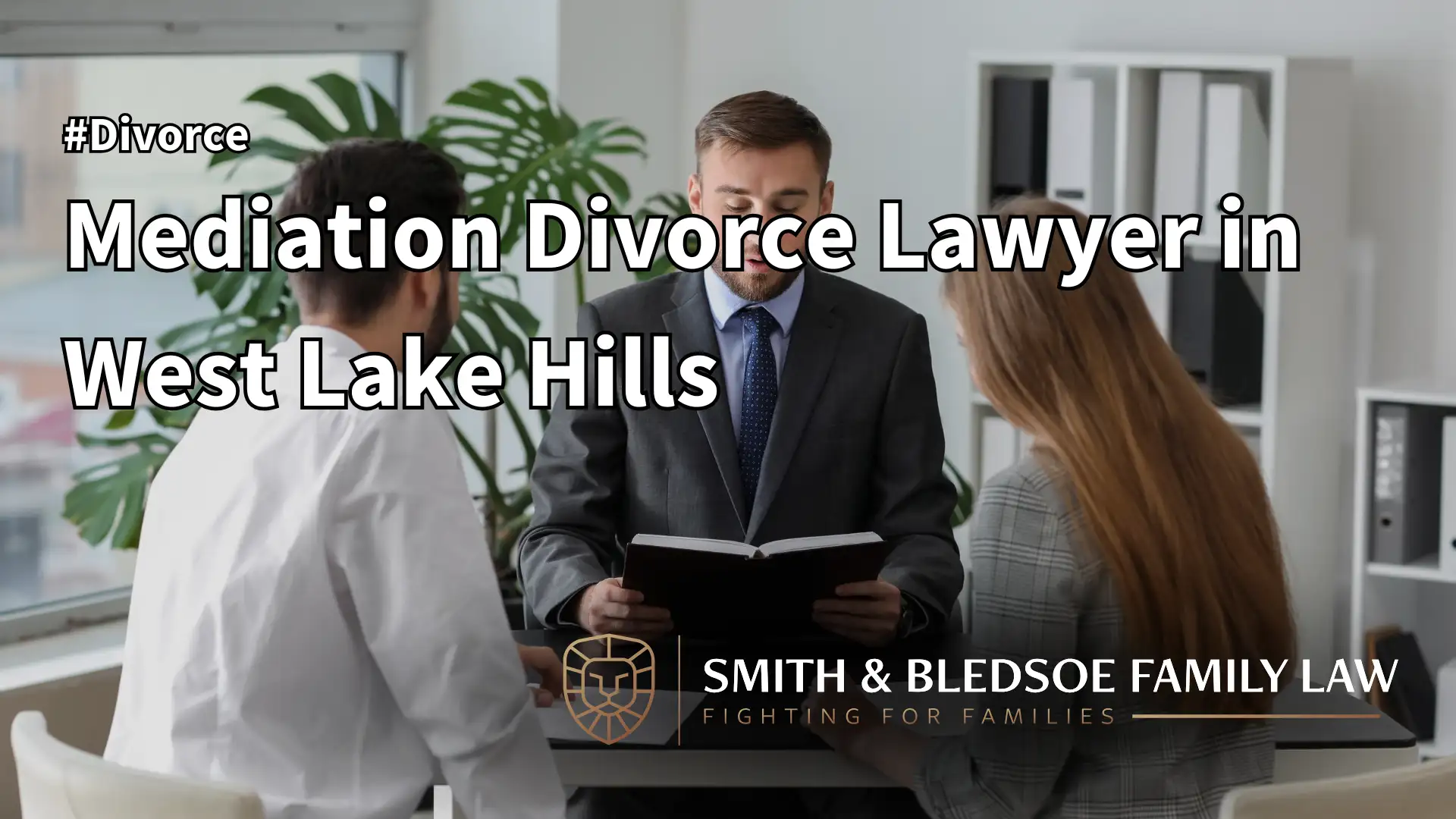
We understand that most people prefer maintaining control over their divorce outcomes rather than leaving these important decisions to a judge. Our experienced mediators facilitate productive conversations that lead to lasting resolutions.
Call us today for a free case evaluation with a skilled divorce mediation lawyer in West Lake Hills.
What Is Divorce Mediation?
Divorce mediation represents a voluntary, cooperative approach to ending your marriage, providing clarity and guidance throughout the divorce process. Instead of battling in court, you and your spouse work with a neutral third-party mediator who facilitates productive discussions about divorce-related issues. The mediator doesn’t make decisions for you but helps you communicate effectively and explore potential solutions.
During mediation sessions, both spouses have opportunities to express their needs, concerns, and preferences. The mediator guides these conversations so that both parties remain respectful while working toward agreements on matters such as:
- Property and asset division
- Child custody and visitation
- Child support
- Spousal maintenance
- Retirement accounts
Unlike court proceedings, mediation allows couples to customize solutions for their unique circumstances rather than having standardized judgments imposed upon them.
Benefits of Choosing Mediation
Mediation offers numerous advantages over traditional litigation for divorcing couples in West Lake Hills, including:
- Greater control over outcomes – You and your spouse make all decisions rather than a judge.
- Reduced conflict – The collaborative environment encourages cooperation instead of confrontation.
- Faster resolution – Mediation typically concludes more quickly than court proceedings.
- Cost savings – Mediated divorces generally cost significantly less than litigated cases.
- Confidentiality – Discussions remain private, unlike public court hearings.
- Better compliance – Couples tend to follow agreements they have helped create.
- Improved communication – The process teaches constructive communication skills that benefit ongoing co-parenting.
- Less emotional trauma – The supportive environment minimizes stress for all family members.
- Preservation of relationships – The non-adversarial approach helps maintain civility between ex-spouses.
- Customized solutions – Agreements reflect your family’s specific needs rather than one-size-fits-all court orders.
- Legal assistance – Experienced mediators and attorneys provide the necessary guidance to achieve mutually beneficial outcomes.
These benefits make mediation particularly valuable for parents who must maintain working relationships after divorce and for couples seeking a dignified closure to their marriage.
Mediation vs. Litigation vs. Arbitration
Understanding how mediation differs from other divorce processes helps couples make informed decisions about their approach:
Mediation vs. Litigation
The chief differences between mediation and litigation are:
- Decision-making authority – In mediation, spouses retain complete control with the guidance of experienced divorce lawyers; in litigation, a judge decides.
- Atmosphere – Mediation fosters collaboration; litigation creates adversarial dynamics.
- Timing – Mediation follows your schedule; litigation adheres to court calendars.
- Cost – Mediation typically costs 40-60 percent less than litigation.
- Privacy – Mediation remains confidential; court proceedings become public record.
- Emotional impact – Mediation reduces conflict; litigation often intensifies tensions, making the legal process more stressful.
Mediation vs. Arbitration
Mediation differs from arbitration in these areas:
- Decision-making authority – Mediators facilitate decisions by the couple; arbitrators make determinations.
- Formality – Mediation employs conversational approaches; arbitration resembles simplified court proceedings.
- Outcome certainty – Mediation concludes only when both parties agree; arbitration ends with the arbitrator’s ruling.
- Flexibility – Mediation adapts to emerging needs; arbitration follows predetermined procedures.
- Focus – Mediation emphasizes finding common ground; arbitration concentrates on evaluating competing positions.
When to Consider Mediation for Your Divorce
Mediation serves many divorcing couples effectively, particularly when:
- Both spouses show a willingness to compromise
- Communication remains civil
- There is transparency about finances
- Children’s interests take priority
- Privacy matters
- There are cost concerns
- The couple wants a swifter resolution
Cons of Mediation
However, mediation may not suit every situation. Exercise caution if:
- Domestic violence is a factor in the relationship
- There are significant power imbalances between the spouses
- There are suspicions of hidden interests
- Mental health or substance abuse issues complicate communication
Our divorce mediation attorneys in West Lake Hills help clients evaluate whether mediation suits their specific circumstances, explaining both advantages and potential limitations with the expertise of a family law attorney.
The Divorce Mediation Process
While procedures vary somewhat between cases, most divorce mediations in West Lake Hills follow these general stages:
- Initial consultation – Meet with your attorney to discuss whether mediation would be a good option for your situation.
- Mediator selection – Choose a qualified, board certified mediator, often with recommendations from your attorney based on your specific needs.
- Preparation – Work with your lawyer to identify priorities, gather financial information, and determine acceptable compromises.
- Introductory session – Meet with the mediator and your spouse to establish ground rules, identify issues requiring resolution, and create an agenda.
- Information exchange – Share relevant financial documents, property information, and other evidence according to the agreed-upon schedule.
- Negotiation sessions – Participate in structured discussions about each contested issue, exploring potential solutions with the mediator’s guidance.
- Agreement drafting – Document resolved matters in a comprehensive settlement agreement, with attorneys reviewing the terms for legal compliance.
- Court approval – Submit the mediated settlement agreement to the court for incorporation into your final divorce decree.
Throughout this process, your mediation lawyer from Smith & Bledsoe Family Law, certified by the Texas Board of Legal Specialization, will explain each step, help prepare the necessary documentation, and protect your interests.
Role of a Mediation Lawyer
West Lake Hills divorce mediation attorneys fulfill several essential functions throughout the process, providing professional guidance and support:
- Pre-mediation counseling
- Strategic preparation
- Document organization
- Advocacy during sessions
- Legal advice between sessions
- Agreement review
- Court representation for finalizing your divorce
Some clients mistakenly believe hiring an attorney undermines mediation’s collaborative nature. In reality, knowledgeable legal representation, especially from attorneys with legal specialization, empowers you to negotiate effectively while securing an agreement that protects your long-term interests.
Costs of Divorce Mediation
Mediation typically costs substantially less than traditional litigation, and having a specialized law office can help manage these costs effectively. While specific expenses vary based on case complexity and duration, typical mediation costs include:
- Mediator fees (generally $250-$400 per hour, often split between parties)
- Attorney representation
- Document preparation
- Court filing fees
Several factors influence total mediation expenses, including the complexity of the case and the specifics of Texas law:
- Case complexity (More complex asset divisions or custody arrangements require additional sessions.)
- Preparation level (Well-prepared couples typically resolve matters more efficiently.)
- Degree of cooperation (Willingness to compromise reduces session time and associated costs.)
- Geographic location (Mediator rates vary somewhat by location.)
Child Custody and Support Mediation
Mediation can be particularly valuable for resolving child custody matters and parenting issues. When children’s well-being is at stake, mediation’s cooperative approach helps parents focus on their children’s needs rather than personal conflicts.
During child custody and support mediation, parents address:
- Parenting time schedules – Creating detailed calendars for regular visitation, holidays, and school breaks
- Decision-making authority – Determining whether parents will share major decisions about education, healthcare, and activities
- Communication protocols – Establishing effective ways to share information about children’s needs and activities
- Child support calculations – Developing appropriate financial support arrangements based on Texas guidelines
- Special needs considerations – Addressing any unique requirements for children’s care
- Future modification processes – Creating frameworks for handling changing circumstances as children grow
Our mediation attorneys help clients understand Texas family law principles while exploring flexible options that address their specific concerns and objectives.
Property Division Through Mediation
Texas community property laws establish general frameworks for asset division, but mediation allows couples to create customized arrangements that ensure their assets are protected. Through mediated property settlements, couples can:
- Prioritize specific assets
- Address unique items, such as family businesses, collections, or sentimental items
- Structure transfers
- Consider non-financial factors
- Create win-win solutions
Our mediation attorneys help clients understand Texas property division principles while exploring flexible options that address their specific concerns and objectives, providing the necessary legal representation.
Frequently Asked Questions
Here are the answers to some of our most frequently asked questions about mediation and divorce.
Is the mediated agreement legally binding?
Yes. Once signed by both parties and their divorce attorney, a mediated settlement agreement becomes legally binding. When the court incorporates this agreement into your final divorce decree, it carries the same enforceability as any court judgment.
How long does divorce mediation typically take?
Most divorce mediations conclude within 2-4 months from initial session to final agreement. This timeline contrasts favorably with litigation, which often extends 12+ months in contested cases.
What if we can’t reach agreement on all issues?
Partial agreements remain valuable even when some issues prove challenging. You can resolve what’s possible through mediation and reserve contested matters for other processes like arbitration or limited court hearings. This hybrid approach still reduces overall conflict and expense.
Can I bring my attorney to mediation sessions?
Yes. While some mediators work directly with couples, having your attorney present provides important legal protection and guidance. Your lawyer can help you understand the implications of all proposed terms and help advocate for your interests effectively.
What makes a good candidate for divorce mediation?
Good candidates demonstrate willingness to compromise, ability to communicate respectfully despite emotional challenges, commitment to transparency, and focus on finding workable solutions rather than “winning.” Most importantly, successful mediation participants prioritize fair outcomes over punishing their spouse.
Contact Our West Lake Hills Divorce Mediation Lawyers
At Smith & Bledsoe Family Law, our experienced legal team helps clients throughout West Lake Hills find amicable, efficient resolutions that protect their interests while minimizing conflict and expense.
Our team focuses on empowering clients to make informed decisions while facilitating productive negotiations in family law matters. As partner Brandon Bledsoe puts it: “Don’t create unneeded conflict, but don’t be afraid of conflict when needed.” Whether you’re just beginning to consider divorce or already engaged in the process, we will provide skilled guidance of a family lawyer at every step.
Call our law firm today for a free case evaluation with a divorce mediation lawyer in West Lake Hills. Let our firm help you achieve a dignified resolution that allows you to move forward with confidence with our years of experience.
